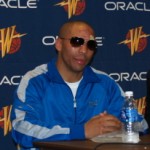S.O.G., Sweetness and BDK

“Now is my time. I have to show and prove.” – Allan Green, June 8, 2010
“The non-resistible, non-competible – no, no, I’m not sayin’ I’m the best! . . . I’m just sayin’ I’m f–kin’ incredible.” – Big Daddy Kane, “Show & Prove,” 1994
There’s something witty and even charming about Allan “Sweetness” Green. Whether it’s his Sooner upbringing, his zigzagging career path or his willingness to say unpopular things, Green is the sort of self-scripted character American athletics needs more of. He’s also an American athlete who has come, somewhat suddenly, to a dream opportunity.
We’ll see what he does with it.
Saturday, in the third and final fight of Group Stage Two of Showtime’s “Super Six” tournament, Oklahoma’s Allan Green will battle California’s Andre “S.O.G.” Ward in Oakland. Oracle Arena, a 20-minute drive from Ward’s home, will play host to a match for both the WBA super middleweight belt and an almost certain advancement to the semifinal round for Ward.
For Green, things will be more complicated. Green is, after all, a replacement. After a violent knockout loss to Arthur Abraham, Jermain Taylor withdrew. Green inherited Taylor’s spot in the tourney and Taylor’s accumulated points – zero.
“No offense against Jermain,” Green said last Tuesday about an April 2009 Showtime telecast. “But we fought on the same show, and I won my fight, and he lost his fight. I got pushed back to ‘ShoBox,’ and he got put into the tournament.”
But Green’s here now, and he bears something of a grudge. So does Andre Ward – whose nickname is an abbreviated “Son of God.” Neither man feels properly respected in his profession.
Ward is America’s last Olympic Gold Medalist boxer, a title he’s held for six years and might well hold for six more. He has been handled judiciously, building a strong hometown following in Oakland without challenging for a world title until his last match. He is a humble and likable man. Accusations of coddled treatment, though, have followed him, with many observers mistakenly using “coddled” as a synonym for “soft.” It isn’t. And it sure wasn’t on Nov. 21.
That day, Ward manhandled Mikkel Kessler, whom most considered the tournament favorite. Ward took the “Viking Warrior,” roughed him up, and reduced him to blaming dirty tactics and bad refereeing for his second career loss. It was a more conclusive performance than anyone expected.
But then a recurrent knee injury led Ward to postpone his match with Green, and Green was unhesitant in speculating about the seriousness of Ward’s next opponent, if not his injury. Green said, had that opponent still been Jermain Taylor, there would be no delay. Ward took the comments personally – as they were intended. Asked Tuesday if the comments bothered him, Ward responded with typical seriousness and grace.
“Bother me? No,” Ward said. “Use them? Yes.”
There’s no telling how much Green intended to rile Ward. Frankly, there’s no telling lots of things about Green. If you’re just now tuning in to the Allan Green show, you’ll quickly learn: Green is a little off his rocker.
But he has a sense of timing and self-deprecation, and a powerful punch, so you want to watch. Things like that fantastic stare-down picture with Carlos De Leon Jr. last April, one in which Green looked like a lunatic frightened by De Leon’s fist, the day before he went through De Leon in about five minutes. And then there was that memorable speech Green gave on Nov. 4, 2005.
That day Green fought on “ShoBox” against New York City’s Jaidon Codrington, one half of a posse calling itself the “Chin Checkers.” Codrington, in keeping with his blossoming professional identity, gave Green little respect in pre-fight comments. Green caught him with a left hook in the opening 10 seconds and then beat him to stiffened unconsciousness in the eight that followed. Mayhem ensued, as doctors and officials tried to get through Codrington’s people to the unconscious fighter.
And while this happened a few feet away, Green did his post-fight interview. Having just scored Ring magazine’s 2005 Knockout of the Year, Green – in lieu of showing concern for Codrington – began a radio-style advertisement for a local car dealership.
It was a bizarre gesture that made Green look oblivious. But he wasn’t oblivious. More like ironical. Green’s post-fight interview, in retrospect, was the work of a person who stood beside himself and noted life’s absurdity.
Still, it wasn’t until Green used “show and prove” last week that any sort of a line could be drawn to another unlikely American ironist: Big Daddy Kane, a Brooklyn rapper, who despite recording hits in the late 1980s and launching a number of other stars’ careers, never quite achieved the acclaim he deserved. He was another man with a touch of self-deprecation, and a mock-epic style.
“I won’t say I’m the baddest or portray that role,” Kane wrote in 1990. “But I’m up to Top 2, and my father’s gettin’ old!”
You can almost hear Green saying something like that.
Something Green actually did say in the last episode of Showtime’s “Fight Camp 360,” last week caused the conference-call equivalent of what Kane derisively labeled “half-steppin’.” It was Green’s use of the word “jive” to describe Ward’s style. A few people wanted to know what Green meant, but no one wanted to talk about race.
Let’s deal in good faith, folks. Allan Green was saying that, as a black-American prizefighter, he will not be confounded by Andre Ward’s black-American-prizefighting style, the way that Green believes Kessler was. Green was saying that, where Ward’s reflexes, athleticism and slipperiness disarmed Kessler, they will have no effect on him because he comes from the same tradition as Ward. Green considers himself a native “jive” speaker. Big Daddy Kane would approve.
So now, Mr. Green, it’s time to show and prove.
Bart Barry can be reached via Twitter.com/bartbarry